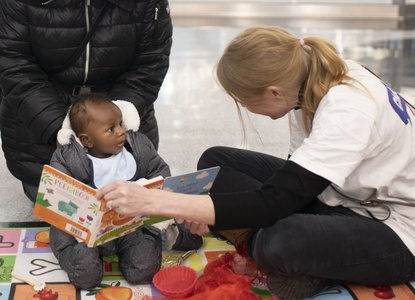The earlier we start chatting to babies, the better!
Talking to your baby helps them learn about the world around them. It also helps them learn how to talk.
Talk to your baby as you go about your daily routine, for example, as you get ready to go out. Make sure your baby can see you as you chat. It doesn’t matter what you say, just tell your baby what you’re doing.
For example: We’re getting ready to go out now ... Look, Daddy is putting on shoes ... Now it’s time to put on your coat ... We’re ready to go now ... I wonder what we'll see on our way to the shops ... I hear a dog barking.
Chat about anything!
- Describe what can you see, smell or hear around you. This could be a big red bus, dinner in the oven or an ambulance siren.
- Talk about your day so far. What has made you happy, sad or cross? Have you met any friends or family today?
- Chat about your day-to-day activities such as cleaning, cooking or doing the shopping. Your baby will enjoy listening to your voice and watching your facial expressions!
Have a natter whenever, wherever!
- When you change your little one’s nappy, you and your baby will be focused on each other. Use this time to talk about what you are doing or sing them a song. It’s a great distraction for little wrigglers!
- While you’re getting your child dressed in the morning, have a chat about the clothes you’re putting on and point out different body parts.
- At meal times, talk to your child about the different foods you like. If you’re weaning, have a chat about the new foods you’re trying today.
- Encourage other family members to chat to your baby too – it all helps.
- You don’t need to stop what you’re doing while you speak, you can do this activity even when you’re busy.

Dummies and talking
Dummies can be an invaluable tool to help settle and calm your baby. They can help soothe babies at bedtime or when they are tired or cross. However, some evidence suggests that frequent use of dummies during the daytime as babies get older, may create problems with your child’s speech.
Babies may be less likely to babble and experiment with sounds when they have a dummy in their mouth. Babbling is an important step in learning to talk, and just like when learning any new skill, practice and exploration are important.
The benefits of dummy use reduce from about six months of age, so around this time start to consider beginning to wean your baby off their dummy.
Tips to help you and your baby manage without a dummy:
- Getting rid of dummies is not easy, however, it may become more difficult as your child gets older.
- When you make changes to how much your baby has their dummy, do it at a time that feels right for you, not during a busy or stressful period.
- First, reduce the amount of time your baby has their dummy:
Remove the dummy when your baby is playing or talking.
When your baby cries, they’re trying to tell you something. Try to work out what’s troubling them first, and begin to only use the dummy when you really need to.
Try only using the dummy at sleep times (for toddlers, letting them know that the dummy must stay in their cot can really help).
- Once you've reduced the time your baby has their dummy for, consider removing it completely – stop using the dummy over a weekend, or at a time when you have support. Most babies and toddlers will adjust within two or three days.
- You know your baby best, and will be able to decide the best time to work on this. If you do need further support ask your health visitor or childcare staff for advice.
Did you know?
Baby babbling is the same all around the world! This means that all babies have the ability to learn any language!
The Department for Education’s Start for Life campaign, delivered in partnership with the National Literacy Trust, has more recommendations about learning to talk.




